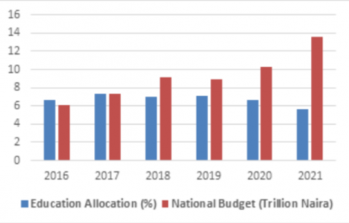There is no gainsaying that summits of international standing provide the avenue for member nations to discuss innovative solutions and commitment to address the core challenges facing them. These discussions oftentimes go beyond just the concerns of participating nations, as issues that affect world peace and human wellbeing are also brought to the fore.
At the recently concluded global education summit which was a key moment for the global community to come together to discuss and support quality education for all children and youth, President Buhari promised to increase Nigeria’s annual domestic education expenditure by 50 per cent over the next two years. The summit was held from July 28 to 29, 2021 in London, United Kingdom (UK) and it was co-hosted by the British Prime Minister, Boris Johnson and Kenya President, Uhuru Kenyatta.
During the event, President Buhari and other leaders signed a form of commitment, contained in a document titled, “Heads of state call to Action on Education Financing Ahead of The Global Education Summit.” In Buhari’s words, he said; “We commit to progressively increase our annual domestic education expenditure by 50 per cent over the next two years and up to 100 per cent by 2025 beyond the 20 per cent global benchmark [1]”. It is against this background that the tone for this essay is set. The writer critically interrogates the issues around President Buhari’s pledge while exploring the impediments, possibilities and potential benefits.
What are the benefits…?
Truly, the global education summit gives credence to the fact that a well-funded education sector brings development and economic benefits for the good of a country. In this perspective, an opportunity for a five-year pledge was presented for leaders (including President Buhari) to drum up support for Global Partnership for Education (GPE)’s plan to raise at least, US$5 billion from donors to support education systems in up to 90 countries and territories around the world, where 80 percent of the world’s out-of-school children live. The major benefit of this summit and by extension, President Buhari’s pledge is that access to basic education will improve.
It is imperative to know, however, that the GPE remains the only global partnership entirely focused on improving education in developing countries so they can unlock their potential and contribute to building a better world. It remains a shared commitment to ending the world’s learning crisis. As a funding platform, the GPE stimulates international and national support for education in third-world countries, especially focusing on the poorest and most vulnerable children and youth. The GPE supports partner countries in building stronger and more resilient education systems to ensure that children get access to quality education [2].
Interrogating some benefits around President Buhari’s pledge, Nigerians should realize that the country already receives substantial funding from the GPE. For instance, just a month before the summit was hosted, the British High Commission stated that the GPE formally announced the approval of a new grant for Nigeria of $125 million; an education programme that will be implemented by the World Bank in Oyo, Katsina and Adamawa states [3]. In June 2020, the GPE approved a $15 million COVID-19 emergency grant to support Nigeria’s response to the pandemic in 16 states. Also in August 2020, it approved a $20 million accelerated grant targeting North-East states of Borno, Adamawa and Yobe states that are worst hit by insurgency while focusing on the girl child and internally displaced children, and marginalized communities suffering from lack of access to education [4]. It’s therefore a no-brainer that Buhari’s pledge was expected. It means the summit highlighted to him, the benefit of putting education at the top of the international agenda especially as the world seeks to respond to and recover from the impacts of the Covid-19 pandemic. To this end, political observers have described his pledge as a step in the right direction. A statement by the President’s spokesperson quoted Buhari as saying at the summit; “We fully endorse the call for more efficient use of resources and to significantly increase investment in education by strengthening institutions, promoting greater adoption of technology, building the capacities of our teachers and mobilizing additional financial resources through legal frameworks and deliberate intervention on a sustainable basis. [5]” No doubt, this statement encapsulates the enormous benefits accruable to Nigeria only if the merits of the summit and in particular, Buhari’s pledge are sincerely handled.
In the meantime, Nigeria has had a fundamentally weak and underfunded education system, having a record of the highest out-of-school children in the world. Of the 20 million children who were out-of-school worldwide in 2017, 10.5 million of them were from Nigeria [6]. This means that one in every five of the world’s out-of-school children is in Nigeria at the time. Yet, UNICEF.ORG reports that even though primary education is officially free and compulsory, only 61 per cent of 6- to 11-year-olds regularly attend primary school, and only 35.6 per cent of children aged 36 – 59 months receive early childhood education [7]. So, if the Buhari pledge is properly implemented, the dynamics can be altered for the better.
But is the pledge a mere rhetoric or window dressing? Does President Buhari exhibit the necessary credentials to deliver on the pledge? Does this pledge hold any possibility of actualization?
As encouraging as the pledge may appear, there is a seeming lip service especially from a government of his that has blatantly ignored the United Nations Educational, Scientific and Cultural Organization (UNESCO)’s benchmark for education funding. Under the UNESCO’s Education 2030 Framework for Action as well as the Education for All programme, the UN Agency proposed that governments allocate at least 4 per cent to 6 per cent of their Gross Domestic Product (GDP) to education, and/or allocate at least 15 to 20 per cent of public expenditure to education [5][8].
Now, after the Buhari administration took the baton of leadership from former President Goodluck Jonathan in May 2015, it allocated N369.6billion to education in 2016, which amounted to 6.7 per cent of the national budget of N6.06trillion. In 2017, N550.5billion or 7.38 per cent of the N7.29trillion budget was allocated to the sector. In 2018, N605.8billion, out of N9.12trillion budget, representing 7.04 per cent, was allocated to education; in 2019, it was N620.5billion, signifying 7.05 per cent of the N8.92trillion budget. In 2020, N671.07billion of N10.33trillion, which amounted to 6.7 per cent, was allocated to the sector; while in 2021, the sector got N742.5billion of the N13.6trillion budget, representing 5.6 per cent [5]. From this analysis, the writer developed a table and a chart resulted from the table to aid understanding. After all, a picture they say is worth more than a thousand words. In this case, (2500) ± 10% words one may say.
Table showing domestic budgetary allocation to the education sector in the last six years of Buhari’s Regime
| Year | 2016 | 2017 | 2018 | 2019 | 2020 | 2021 |
| % Allocation | 6.70% | 7.28% | 7.04% | 7.05% | 6.70% | 5.60% |
| National Budget | N6.06Tri | N7.29Tri | N9.12Tri | N8.92Tri | N10.33Tri | N13.6Tri |

From the table and chart above, it is crystal clear that the present administration does not adhere to the UNESCO benchmark of 15 – 20 per cent budgetary allocation for education funding. While the domestic national budget for each year under review increased, the budgetary allocation to the education sector experienced a decline. There is a downward curve should a graph of the budgetary allocation to education be plotted. Tellingly, analysts have condemned the Federal Government’s budgetary disbursement to this crucial sector. They have particularly described the Buhari administration’s 2021 budgetary provision to Education as the worst in the last decade. As a result, reconciling this development with his pledge to increase Nigeria’s annual domestic education expenditure by 50 per cent over the next two years and up to 100 per cent by 2025 beyond the 20 per cent global benchmark becomes somewhat difficult. It thus brings the sincerity of Buhari’s utterances at the recently concluded summit under intense scrutiny. This makes the possibility of actualizing his pledge questionable because it remains to be seen how the President, whom last December signed the lowest allocation to education in 10 years, will fulfill his pledge. It leaves the assumption that the promises he made remain mere rhetoric or window dressing as he seemingly does not exhibit the needed credentials to deliver on his promise. Mentioning 2025 alone leaves a lot to be imagined because he would have been out of office after the 2023 general elections already. Regrettably, whenever a new government comes into power in Nigeria, they change whatever policies and programmes they met in place. This brings about a waste of resources and incomplete projects. There is no guarantee that the next president will deliver on Buhari’s pledge especially if the candidate is from a different political party and ideology.
Meanwhile, the government is no stranger to ‘empty’ promises. During the commemoration of World Teachers Day in October 2020, Buhari approved a special salary scale for teachers in the country. Disturbingly, it was only after a recent media interrogation that the Federal Government, through one of its agencies, revealed that different committees had been set up to come up with the modality for the implementation of a new salary scale [5]. This remains the typical model of promises this administration has been known for. To make hasty promises of such a nature knowing full well that education is on the concurrent list in the 1999 constitution beats imagination. Its implementation was going to hit the rocks because the cart was seemingly placed before the horse since no consultations were made from states and other stakeholders before announcing the special salary scale.
How about some impediments…?
Truly, financing the education sector in Nigeria has to do with the allocation and effective use of resources garnered from both internal and external sources. It is hoped that the commitment shown by President Buhari at the global education summit will transform the country’s education sector from a poor and disappointing state to an improved one if some impediments are deliberately surmounted.
The first impediment to the financing the educational sector is the lack of willingness and commitment amongst the various levels of government. To a large extent, the government is not answerable or held responsible for the money owned the sector. Meanwhile, the federal government does not come out smelling of roses in this regard. For instance, the problems that led to the nine-month old strike by the Academic Staff Union of Universities (ASUU) in 2020 still stares everyone in the face. Contentious issues like the earned academic allowances of these lecturers as well as the revitalization fund are still being handled without the seriousness it deserves by the Federal government. Needless to say, the revitalization fund, does underscore the need to improve Nigeria’s university education system through adequate government funding. Should another ASUU strike happen as a result of the government’s brazen attitude and neglect, the consequence of this impediment would be grave.
Another impediment to Buhari’s pledge is corruption. From the point of release of funds to the use of these funds in the actualization of projects, these processes are characterized by the avalanche of corrupt practices and mismanagement of funds. Very many government officials in the education sector are influenced by money in order to serve their personal interests, while some lawmakers are reluctant to pass budgetary frameworks unless they are being bribed or lobbied.
Yet, where the economy is not growing at a reasonable high and sustainable rate, the present administration will not have the resources to fund a large sector such as education. The unimpressive growth rate of the country’s GDP would translate to severe resource constraints, which could affect the education sector in the long run. Proceeds from (crude) oil on which the Government depends heavily are highly subjected to price fluctuations in the international oil market. Such uncertainties in the major revenue item of government mean that without careful planning, the implementation of Buhari’s education summit pledge could be subject to failure.
Conclusion
Now, having interrogated the issues around the President’s pledge at the global education summit in London, he must begin to rise beyond the applause he received on the floor of the summit and also rise beyond any form of sweet rhetoric and get ready to match words with actions. To this end, the Federal Government’s recent approval of the disbursement of N292.66 billion to select public universities, polytechnics and colleges of education under the Tertiary Education Trust Fund (TETFUND) in each of the six geopolitical zones of the country should be seen as a welcome development [9]. Such disbursement plans should also be encouraged to go the way of the Universal Basic Education Commission (UBEC). Obviously, what is sauce for the goose is sauce for the gander, and it will go a long way to help UBEC in reducing school drop-outs while increasing access to basic and early childhood education.
While this is done, relevant Federal Government agencies must keep a diagnostic eye to monitor the flow of funds within the UBEC and TETFUND in this regard. This is with a view to stemming the tide of corruption and mismanagement of funds within the education sector at large.
The National Assembly as well as state assemblies must get ready to throw their weight behind President Buhari to see that he fulfils his pledge and deliver on his commitments. The lawmakers shouldn’t frustrate his plans when the need arises for them to make legislation during national budget approval and passage. The executive and the legislative arms of government must work in synergy in this regard.
Ultimately, Nigeria must begin to diversify its economy. The country’s over-reliance on Crude oil as a major source of funds doesn’t hold any prospect for President Buhari. Other sectors like Agriculture and solid minerals should be exploited accordingly to help grow the nation’s GDP.
While it is true that the Covid-19 pandemic alongside the growing insecurities in different parts of Nigeria is seemingly rolling back the progress meant to be achieved in the education sector funding, the President must never relent. He should not fail to partner with relevant national and international donor agencies to help him deliver on his pledge. Nonetheless, may God strengthen President Buhari because, uneasy truly lies the head that wears the crown.
References
[1] https://www.premiumtimesng.com/news/more-news/476289-buhari-pledges-50-per-cent-increase-in-education-budget-in-two-years.htm (accessed on 23rd August 2021 @17:00 hrs)
[2] https://ec.europa.eu (accessed on 24th August 2021 @15:00 hrs)
[3] https://www.sunnewsonline.com/education-uk-others-to-raise-5bn-for-out-of-school-children/ (accessed on 23rd August 2021 @17:00 hrs)
[4] https://www.globalpartnership.org/results/stories-of-change/nigeria-keeping-boys-and-girls-school-and-learning (accessed on 23rd August 2021 @18:00 hrs)
[5] https://headtopics.com/ng/buhari-s-50-per-cent-allocation-to-education-pledge-punch-newspapers-21323221 (accessed on 23rd August 2021 @14:00 hrs)
[6] Innocent Otache (2020), “Poor reading culture in Nigeria the way forward,” African Journal of Social Sciences and Human Research, Volume 3, Issue 4, 2020 (pp. 25-37) OR https://cmonionline.com/2021/06/04/bring-back-our-reading-culture-by-chukwuemeka-oluka/ (accessed on 24th August 2021 @17:00 hrs)
[7] https//www.unicef.org/Nigeria/education (accessed on 25th August 2021 @17:00 hrs)
[8] http://gem-report-2016.unesco.org/en/chapter/target-4-8-finance/ (accessed on 24th August 2021 @17:00 hrs)
[9] https://dailypost.ng/2021/08/24/fg-to-bury-n292-66-billion-in-select-public-universities-polytechnics/ / (accessed on 24th August 2021 @18:00 hrs)
Chukwuemeka Oluka is a graduate of Electronic and Computer Engineering from the Nnamdi Azikiwe University, Awka, Anambra State. He is a research enthusiast and a passionate writer. He writes in from Enugu and can be reached via “write2oluka@gmail.com”







